By: Holm Akhdar team (Shabwah)
Feb 7, 2021 (Holm Akhdar) – In November 2010, Shabwah Governorate, located amid the southern part of Yemen, was exposed to oil pollution for the first time in the area of Kilo 31, adjoining Ataq District. Since then, dozens of constant environmental disasters have occurred due to frequent oil spills that affected six districts within Shabwah governorate.
Over the past months of the year 2020, the two districts of Al-Rawda and Habban, in Shabwah governorate, have been subject to serious oil pollution due to frequent damage of the crude oil supply pipeline. This oil pipeline connects the production fields, in the area of West Ayad, to the export tanks in Nashima, and it is owned and managed by the Yemeni Company for Petroleum and Mineral Investments; a Yemeni government company.
Last week, the camera of Holm Akhdar visited the oil-affected areas in Tamoura and Ghurair Valleys of Al-Rawda District in Shabwah, where the environmental disaster threatens the future of the local population.
Large areas in the plains and parts of the desert have been subject to oil pollution. Oil slicks floated on the surface within the agricultural lands, and oil spills reached groundwater sources, where a number of wells were flooded with crude oil.
Oil Pollution Threatens the Population of Shabwah
Shabwah Governorate, made up of 17 districts, is about 47,584 square kilometers. Agriculture, farming, beekeeping, and fishing are main activities for its population.
During the past 11 months, the affected people in Tamoura and Ghurair valleys of Al-Rawda District did not receive any response or solutions from the perpetrator that caused the damage, in a way that alleviates their suffering from the oil pollution besieging the area.
Mohammad Habtoor, a resident of Wadi Ghurair – the oil-affected area in Al-Rawda district, told Holm Akhdar: “In April 2020, the oil spills started in Wadi Ghurair and had tremendous effects on the agriculture in this area, and it has been leaking since then”.
“Eleven months ago, the oil minister and a number of government officials visited the affected area and saw the magnitude of the oil spill. They promised the residents to work out solutions. However, nothing has changed so far.” Habtoor added.
The disaster affected the sources of water and drinking water, which citizens primarily depend on, due to the fact that most wells are placed in valleys exposed to oil spills
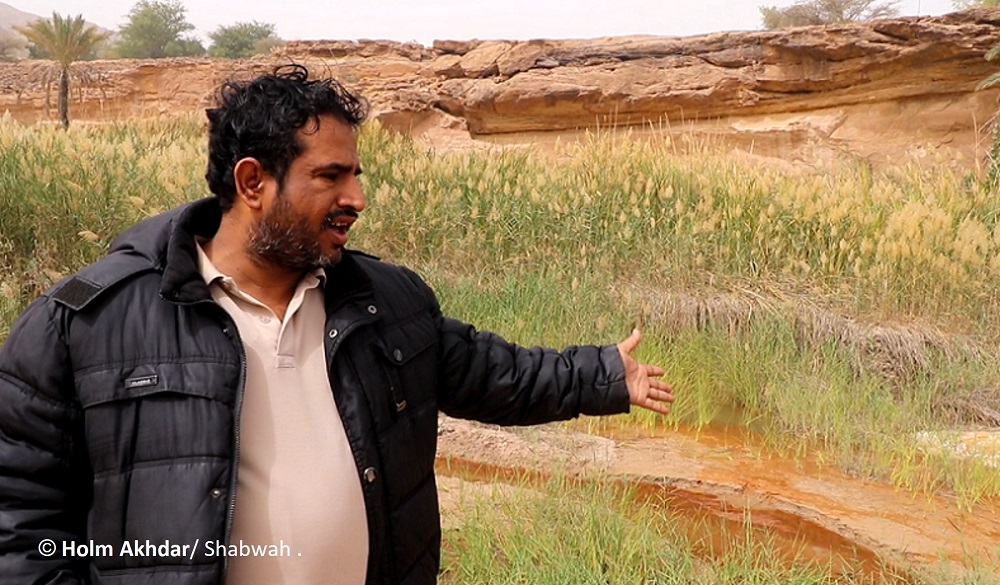
Oil Pollution and Cancer
The Director General of the General Authority for Environmental Protection in Shabwah, Mohammad Mujawar, confirms the significant impacts of oil pollution on Wadi Ghurair area (Ghurair Al Saeed) due to the damage of oil pipeline extending from the area of Ayad to Al Nashimah.
In an exclusive interview, Mohammad Mujawar told Holm Akhdar: “The corrosion of the oil pipeline and the oil spill have caused a serious damage to the agricultural soil leading to seriously deteriorated agriculture in the region. The disaster also affected the sources of water and drinking water, which citizens primarily depend on, due to the fact that most wells are placed in valleys exposed to oil spills “.
“Cancer and kidney diseases cases have recently increased in Shabwah. As 296 cancer cases were recorded by the Cancerous Tumor Center in the governorate during 2020, compared to only 120 cases in 2019. The number of cases has doubled even more, and it can be stated that the percentage has reached 100%. Nevertheless, more studies are needed to find out whether these health effects are directly attributed to oil pollution in those areas”. Mujawar added.
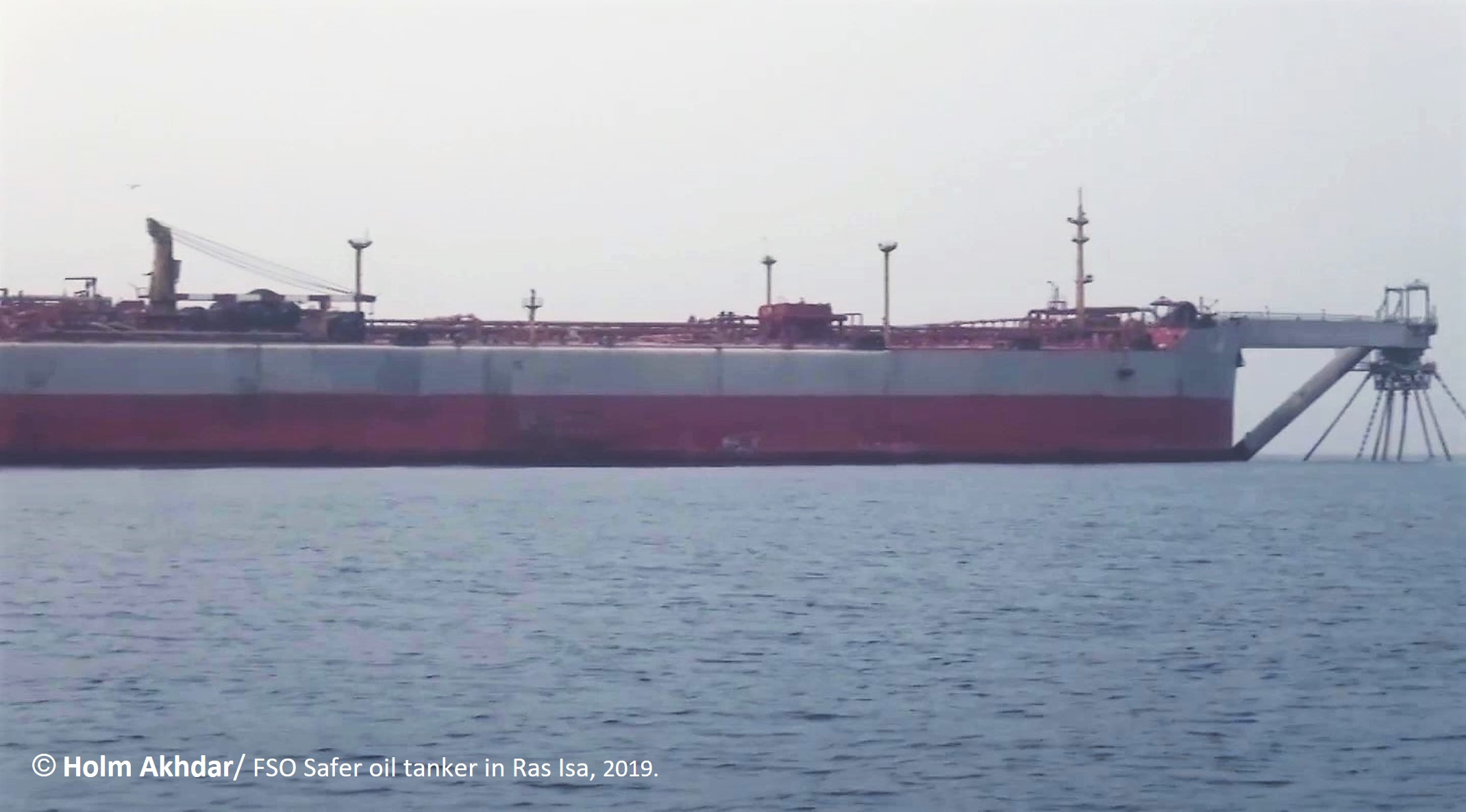
FSO SAFER: A Major Imminent Catastrophe
On the other bank, north the western coast of the Red Sea, Yemen is apparently subject to a greater threat posed by FSO SAFER oil tanker, which was abandoned right off Ras Isa coast in the governorate of Hodaidah, 6 years ago, with 1,148 million barrels of crude oil on board.
In November 2016, FSO Safer’s steam boilers stopped producing inert gas for protection, and the risk of substances evaporating from crude oil has increased to a very high level, according to the Risk and Health Impact Analysis prepared by Riskware experts, this might increase the possibility of an explosion taking place due to ignition of gases amassed in the storage tanks. This oil combustion could cause high levels of air pollution.
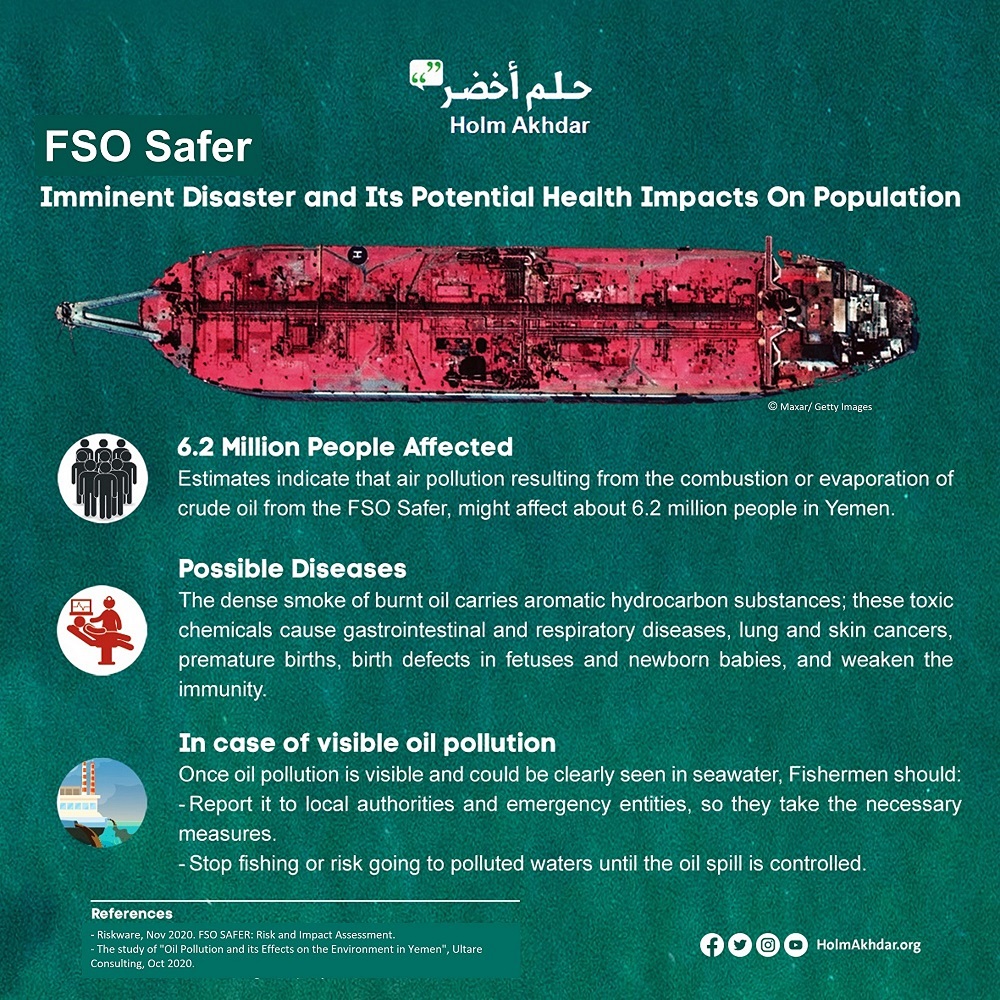
Air Pollution might Affect 6.2 million People
In case of an oil pollution disaster, taking place on the coasts of Yemen caused by the FSO Safer oil tanker, a new major crisis will arise exacerbating the humanitarian crisis that is described, according to the United Nations Agencies, as the worst crisis in the world.
According to Riskware estimations, air pollution resulting from the FSO Safer’s crude oil combustion or evaporation might affect around 6.2 million people in Yemen.
Accordingly, local residents are subject to unexpected health shocks, especially in such a situation where 50% of medical facilities are destroyed by the war in Yemen.
Millions of those affected residents will be in need for urgent and long-term healthcare. Besides, the number of people with respiratory diseases who need treatment will overcrowd a deteriorated health system that has already been suffering from the COVID-19 pandemic.
Moreover, if there should be a disaster, around 40% of agricultural lands in Yemen (500 square kilometers) will be covered with soot due to air pollution.
In a statement to Holm Akhdar, Dr. Abdulghani Jaghman, an environmental expert and consultant at Ultra for Consultancy, says, “Air pollution will occur whether the oil burns or not. If oil burns, it will be a disaster, and if it does not, oil light substances will disperse and scatter all around the area. The damage will not only infect the beaches, but also the coasts, coastal plains, and the overlooking mountainous heights.
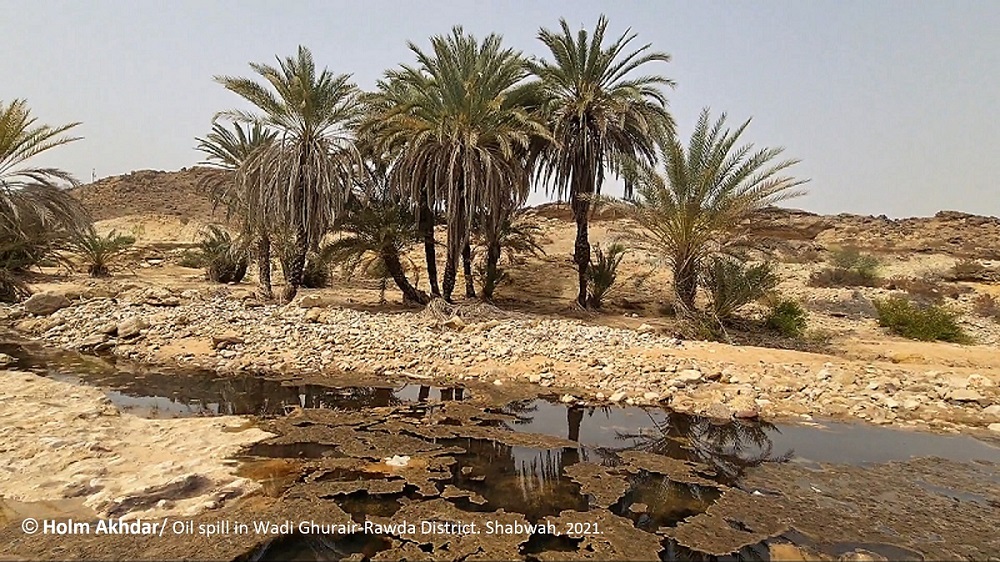
Serious Diseases Affect Residents
Crude oil combustion blocks the sunrays and reduces air currents and moisture in the air, and in general, this might have great effects on the microbial, animal and plant activity.
If there should be an oil combustion on FSO Safer, the dense smoke of the burned oil will carry dangerous aromatic hydrocarbon substances, which have very severe health effects.
Many sources indicate that these toxic chemicals cause gastrointestinal and respiratory diseases, acute lung infections, lung and skin cancer, premature births, birth defects in fetuses and newborn babies, and they weaken the immunity as well.
In case of the FSO Safer exploding, severe oil combustion would cause gas emissions and smoke clouds generating a major problem of acid rain, which in turns would directly pollute the environment, agricultural crops, and human health.
Shabwah: Oil Pollution and Its Impact on Gender
Dr. Eshraq Al-Sebaei, the assistant deputy minister at the Ministry of Public Health, and the official spokesperson for the Supreme National Emergency Committee for COVID-19 in Aden, confirms that pollution does have impacts on gender in Shabwah governorate, as a recent witnessed case, for it has been subject to frequent oil spills over the past two decades.
For the past 18 years, Dr. Eshraq worked as a gynecologist and obstetrician in Shabwah governorate. During her work period, she noticed that most of the medical cases she received were congenital defects, premature births, and cancers.
In an exclusive interview with Holm Akhdar, Dr. Eshraq said: “We have conducted a research study, and it is about to be introduced to the Woman Center at the University of Aden. The study results confirmed that people in the areas, where the study was conducted, were subject to many congenital defects, premature births, and many infertility diseases”.
“In addition, perceptible effects on gender have been noted. Furthermore, pollution had remarkably affected people’s bodies within the study area. There are those who have had skin cancer and leprosy disease, and herein we call on the in charge and concerned authorities to make some reforms and take necessary measures, especially in the areas near the oil production fields. Besides, oil companies have to meet their commitments in preserving the environment adjoining oil production fields by using modern methods when extracting Oil. Plus launching awareness-raising campaigns for people in the affected areas”.
“In case of the FSO Safer exploding, severe oil combustion would cause gas emissions and smoke clouds generating a major problem of acid rain, which in turns would directly pollute the environment, agricultural crops, and human health”. Dr. Eshraq added.
Rasha Island, 3 km off the moored FSO Safer, is a unique fish environment, due to its diversity of distinctive coral habitats. It, however, would be the first island damaged by any potential oil spill, followed by Kamaran Island, which is rich in Mangroves.#SalvageTheSAFER pic.twitter.com/VC2pa6V1rx
— حلم أخضر Holm Akhdar (@holmakhdar) December 26, 2020
Effects Related to Consumption
According to experts, people’s health in coastal communities along with marine life are vulnerable to threats of frequent marine crude oil pollution incidents, resulting from ship waste or oil tankers spills.
In this context, Dr. Hisham Naji, the professor of coastal environment at Sana’a University, is firmly warning of these effects in case of oil spills into the sea, and there appear oil slicks on the sea surface that cause a major problem with serious environmental and health repercussions.
“If this happens, these oil slicks will start to dissolve and mix with water, forming an oil emulsion. This oil emulsion causes suffocation for marine organisms as it covers them and prevents them from breathing. Besides, fish and other marine organisms will carry a large number of heavy and toxic elements that would eventually lead to their contamination or devastation. Dr. Hisham told Holm Akhdar.
“Also, people who feed on these organisms: fish and other marine life, will surely get polluted and poisoned once the eat them”. He added.
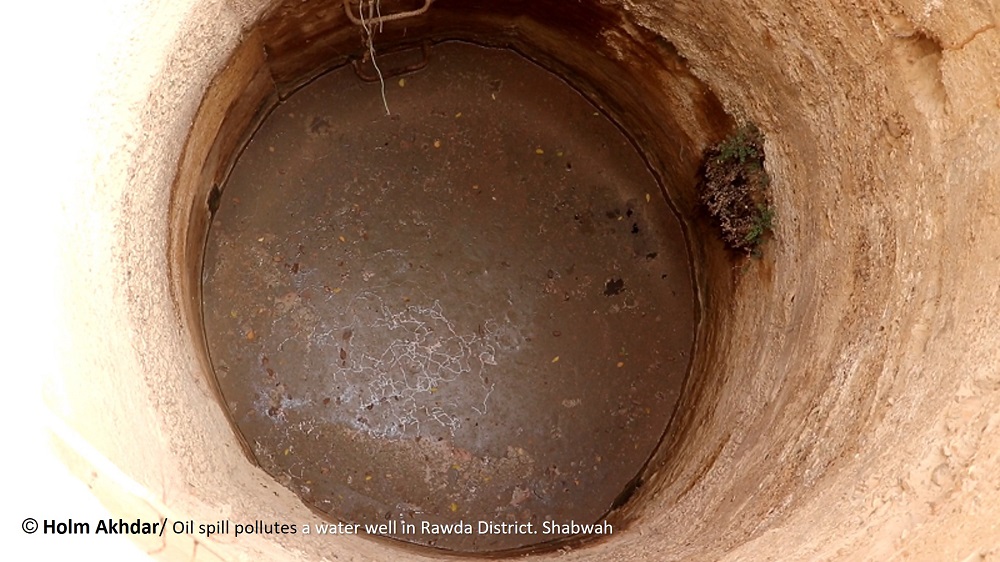
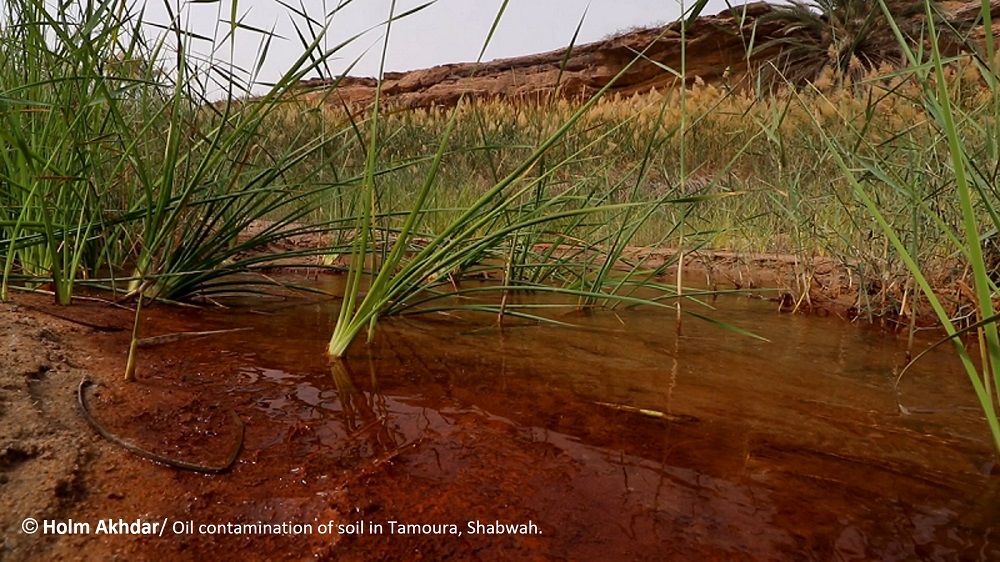
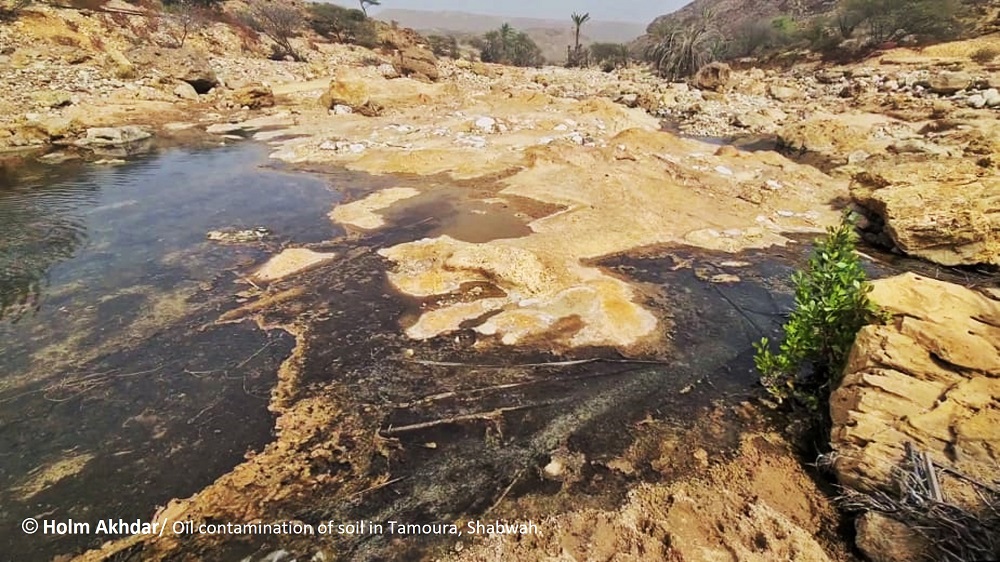
Destruction of Agricultural Soil Tissue
Dr. Abdulwahab Al-Sanabani, an Associate Professor of Invertebrates at the University of Thamar, believes that the most prominent health effects of crude oil spill on land is the destruction of agricultural crops, and it is clearly seen in Shabwah nowadays.
Moreover, Dr. Alsanabani asserts that the danger of oil pollution lies in destroying the soil tissue and killing microorganisms such as nitromonas and nitrobacter, which contribute to the fixation of the atmospheric nitrogen that plays essential role in the growth and reproduction of many plants, especially plants that need protein formation in their bodies, such as legumes.
Talking to Holm Akhdar, Al-Sanabani continued, “as for water pollution (sea and fresh water) caused by oil spill, it destroys all living organisms within the contaminated area, such as fish, floating organisms, crustaceans, or organisms responsible for oxygen fixation such as diatoms and green algae. This oil pollution extends from the sea surface down to around 200 meters underwater.
“Spilled oil also harms the birds that feed on fish, besides; the sediments of oil particles destroy the coral reefs and cause an imbalance in the biological species. All these have direct impact on human, as he/she is the main consumer of marine organisms”. Al-Sanabani added.
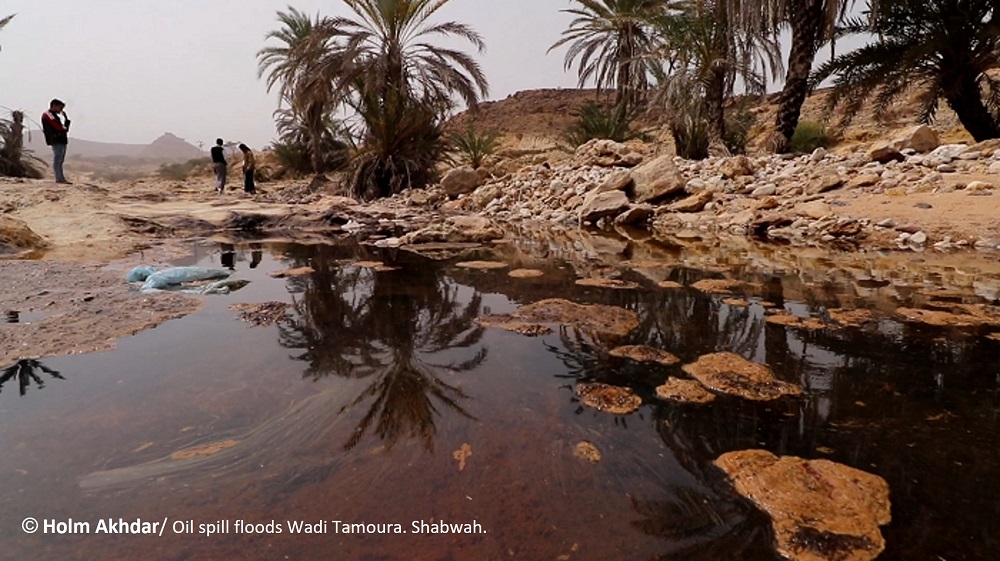
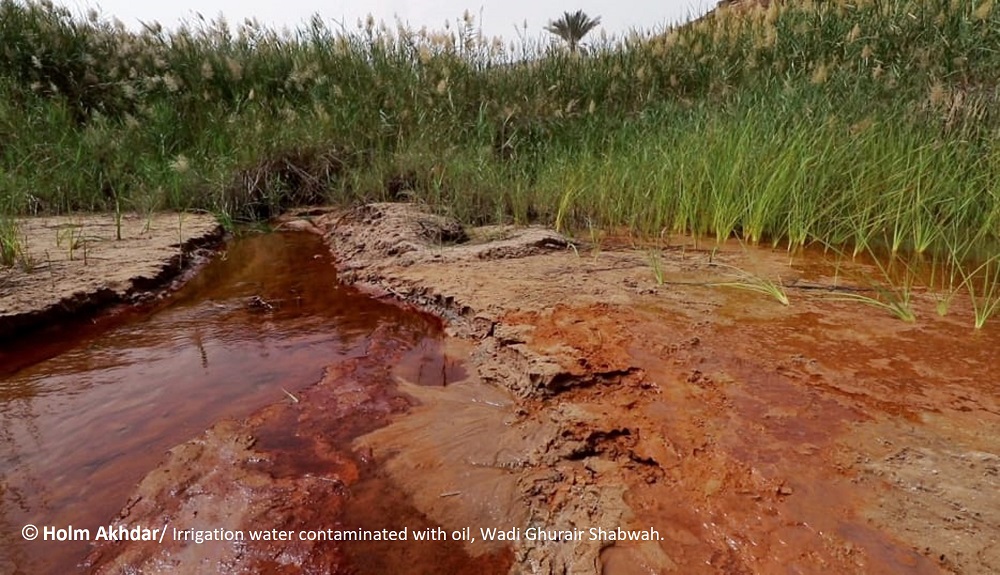
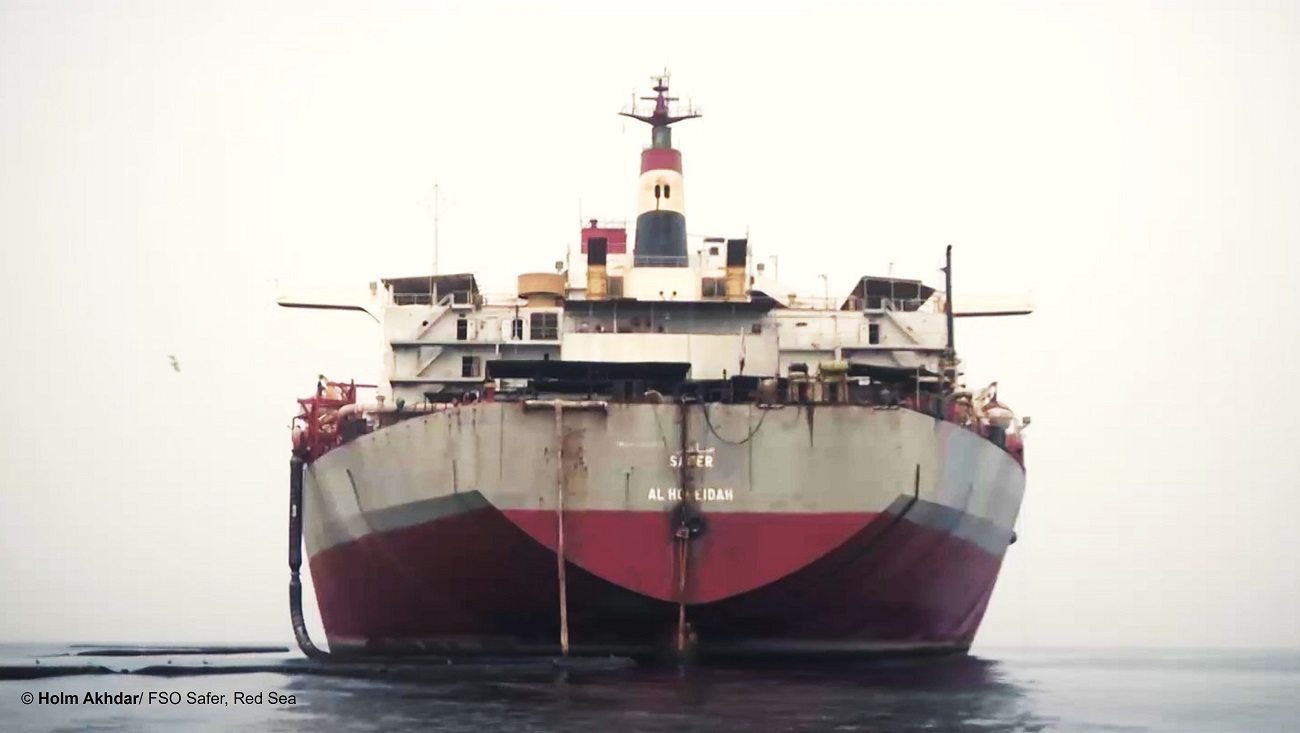
FSO Safer’s Catastrophe might Reach the Coasts of Shabwah!
Yemen’s coastline is more than 2,200 km long. It extends from the Red Sea to the Gulf of Aden and further to the Arabian Sea.
As some estimations indicate, the impact of potential crude oil spill or combustion from the FSO SAFER oil tanker might widely spread, helped by the conditions of water currents, winds and dispersion, and reach the suburbs of Yemeni cities overlooking the western coast, the Gulf of Aden and the Arabian Sea.
Director of the EPA Shabwah, Mohammad Mujawar, agrees with these estimations and asserts to Holm Akhdar that the coasts of Shabwah are uniquely known for their coral reefs, and vital diversity of fish. Thus, in the occurrence of any oil pollution from Safer oil tanker, a terrible disaster is expected to strike Shabwah.
Furthermore, if an explosion or oil spill occurred from the FSO Safer oil tanker, the coasts of Shabwah Governorate will be subject to an environmental disaster due to the existence of environmental preserves like Bir Ali preserve, which includes 5 islands, in addition, the coral reefs as well as fish will be subject to serious damage. All this will lead to an unbearable disaster that Shabwah cannot stand. Mujawar explained.
In case of a disaster, occurring due to gas ignition from FSO Safer’s storage tanks, toxic gases might reach northern, western and southern residential cities and areas along the Yemeni coast, and its chronic impacts will remain terribly severe for a long time.
References:
- Abdulghani Jaghman, Abdulmonem Habtoor, “Environmental Oil Pollution and its Destructive Impacts on the Environment in Yemen”. Ultare Consulting, Bucharest, Romania. 2020.
- Emad Makki, “Emissions of Oil Refining Industry: Sources and Methods of Treatment”, (Oil and Arab Cooperation), V 44, Issue 164, 2018.
- Riskware, “Safer Tanker: Risk and Impact Assessment”, UK, November 2020.
- The Sixth National Report on Biodiversity in Yemen, EPA and the United Nations Development Program (UNDP), March 2019.


